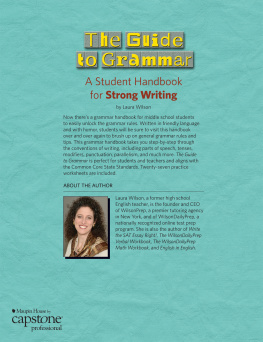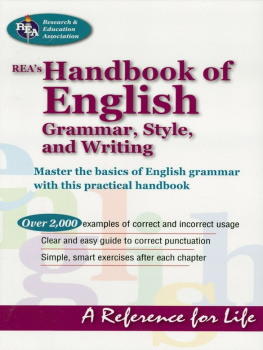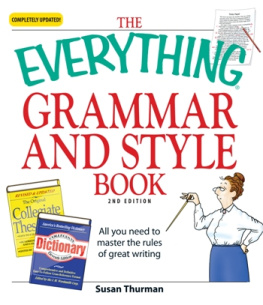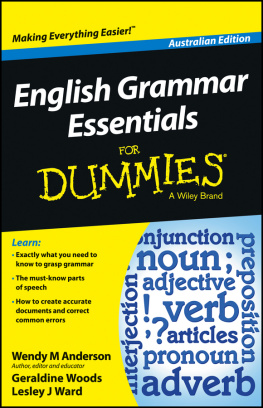
Senior Editor:
Paul Moliken
Writer:
Douglas Grudzina
Cover and Text Design:
Larry Knox
Layout and Production:
Jeremy Clark
Reviewing Teachers:
Sharon M. Ammon, Houston, TX
Kathleen Carr, New Castle, PA

P.O. Box 658
Clayton Delaware 19938
Tel: 1.888.932.4593
Fax: 1.888.718.9333
Web: www.prestwickhouse.com
2008 Copyrighted by Prestwick House, Inc.
All rights reserved. No portion may be reproduced without permission in writing from the publisher.
Printed in the United States of America.

F or those who use this book, Grammar for Writing will prove to be an exciting and different approach to the notions of correctness and clarity in writing. Using language is one of the few things that children come to school already doing. Children just starting school might have learned how to count, and they might have a sense of adding and subtracting, but their mathematics teachers tend to find them blank slates on which to write correct mathematical knowledge and procedures.
Language, however, is different. Students come to school having already been using language for years. Language has surrounded them from birth. They hear, speak, think, and reason in words. Language has already helped them to understand and interact with their environments, other people, and themselves. They have a sense of what sounds right and what sounds wrong. Theyve already developed some good language habits. But some of their language habits are not so good, and these can actually hinder effective communication or hamper their success in school.
Grammar for Writing, therefore, does not assume that the student is a linguistic tabula rasa on which all the rules can be written. This book does not even presume that there are hard and fast rules.
Instead, Grammar for Writing invites students to look closely at their own understanding and use of language and, from that understanding, examine the agreed-upon conventions that make communication possible. Grammar for Writing invites the student to examine how and why these conventions exist, and, thus, to remember and apply them more effectively.
The focus of Grammar for Writing is not on correct English or proper English, but on Standard Edited American English, the language necessary for success in the American school, workplace, and marketplace.
Whether your students are Advanced Placement Scholars, challenged learners, or English Language Learners whose primary language is not English, the explanations, examples, and exercises in Grammar for Writing are designed to establish habits of effective communication that are based on understanding, not on a rote application of rules.
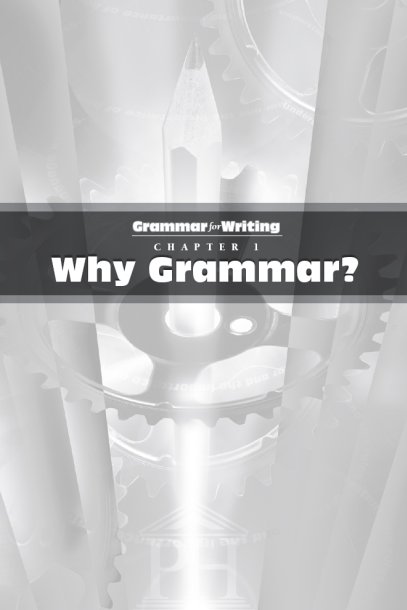
H ere you are at the beginning of a book entitled Grammar for Writing, and youre probably looking forward to studying grammar about as much as youd look forward to listening to someone read to you from the dictionary.
You probably dont see much point in studying grammar anyway, do you? After all, there are more exceptions than rules, right? You think that no one really follows the rules. Breaking the rules is called style.
So whats the big deal?
The big deal is that...
grammar signposts readers listeners writers speakers message understand provides look intended for to the the and or
The words above represent a sentence, and it is a very appropriate sentence for this chapter.
Perhaps you didnt understand it because the writer was more interested in style than in being grammatically correct, and using correct grammar is quite often the same thing as being clear.
The Role of Word Order in English Grammar:
Much of English grammar depends on the placement of the word in the sentence, so maybe if we rearrange the words in the above sentence and punctuate it properly, youll understand it better:
Grammar provides the signposts readers and listeners look for to understand the writers or speakers intended message.
There are, of course, a few other grammatical conventions at work in the sentence above, and we will deal with them in later chapters, but the sentence should give you an idea that English is a language that does depend on the order of the words in sentences.
Look at the following sentence:
an alien general would explain to you what a electric microwave does how
You might get the meaning that a creature from another planet can explain microwaves, but some grammatical and word placement issues are confusing within the sentence. Lets look at it differently, using the exact same words as before, but in a different order:
general how would you explain what a microwave does to an electric alien
This version makes a bit more sense, and it seems to mean that a general can detail the effects of a microwave on an alien. But, again, some grammatical problems alert you to the fact that it still is incorrect. Another version might be slightly better:
how you would explain what an alien electric microwave does to a general
That one implies that a microwave will do something to the general. However, with the words in the proper order and a little punctuation and capitalization, the writers meaning suddenly becomes clear.
How would you explain to an alien what a General Electric microwave does?
The Role of Word Form in English Grammar:
The sample sentence about the alien is short and easy, and it does not communicate a very challenging idea.
Now, take a look at the following sets of words:
I.
corrupt, corruption deny, deniability
II.
simple, simply ride, rode, riding
III.
perform, performing, performance real, reality, really
All of the words in each set above are related, but the different form of the words in the set gives them a slightly different meaning. You can easily understand the differences between these various forms, but when used incorrectly in sentences, their meaning is confusing and bothersome.
The paragraph that follows is only three sentences long, but it expresses a much more complicated idea, which needs to be explained using correct word form. Can you make it sensible?
Good is not simple the absent of evil. Just as evil implied the perform of some intention deed of corrupt or destruction, the notion of good suggest the intention perform of some positive act, what Wordsworth might have call those little, nameless, unremembered act of kindness and of love. Good, then, might be as simply as hold the door open for another person or left a penny at the cash register. The merely absent of evil is more like neutral, not good.
Chances are, you could understand the passage, despite the incorrect word formsafter all, the words are all in their correct order, and the conventions of capitalization and punctuation have been followedbut you also know its not right. If the passage appeared on an employment application for a company you ran, you would probably be hesitant to give the writer the position. If you heard it in a campaign speech, you would probably not vote for the speaker. However, if you wrote it as the essay on your college application, there is no way that youd be accepted for admission.
Next page


